The Zimbabwe Lawyers for Human Rights (ZLHR) has accused the Zimbabwe Electoral Commission (ZEC) of arbitrarily denying several Zimbabwean human rights defenders to observe the upcoming elections, citing unknown security concerns.
Close to 10 human rights defenders, who had submitted applications to ZEC to observe the general elections scheduled for Wednesday, August 23, 2023, had their applications rejected, with ZEC citing hidden “security reasons” in some cases for such ‘arbitrary’ decisions.
Among those barred from observing the general elections are, prominent clergyman Bishop Ancelimo Magaya of the Zimbabwe Divine Destiny (ZDD), human rights lawyers Kika Musa, and Arnold Tsunga and pro-democracy campaigners Tapiwa Chiriga, Rashid Mahiya, Blessing Ivan Vava, Rachel Kadau and Dalphin Magaya.
So far, ZLHR has challenged ZEC’s decision at the Electoral Court and is awaiting a consolidated hearing of three cases this Tuesday in which they are challenging the rejection to accredit Tsunga, Musa, Bishop Magaya and Magaya as election observers.
Tsunga is represented by lawyers, Jeremiah Bamu, Tinashe Chinopfukutwa and Kelvin Kabaya who filed an urgent application at the Electoral Court against ZEC’s ‘arbitrary’ decision and conduct.
The lawyers also seek the court to declare ZEC’s decision to refuse Tsunga admission to observe the harmonised elections as null, void and of no force.
The rejection of the pro-democracy campaigners was learnt when representatives from Magaya, Kika, Tsunga, Chiriga, Mahiya, Vava, Kadau, and Magaya inquired with ZEC about their accreditation status to witness elections as they were told their applications had been rejected without explanation.
The aggrieved clergyman, human rights lawyers and pro-democracy campaigners then engaged lawyers from ZLHR, who wrote letters to ZEC protesting that the elections management body’s decision and conduct were unlawful and arbitrary.
In the letters, ZLHR lawyers Chinopfukutwa, Kabaya and Chris Mhike stated that in terms of Section 68(1) of the Constitution, their clients have a right to administrative conduct that is lawful, substantively and procedurally fair.
Chinopfukutwa, Kabaya and Mhike protested that ZEC’s conduct and arbitrary decision in declining their clients’ application for accreditation as election observers is procedurally unfair and a violation of their right to administrative justice as provided in terms of section 68 of the Constitution.
The clergyman, human rights lawyers and pro-democracy campaigners, Chinopfukutwa, Kabaya and Mhike argued, have a right to be furnished with written reasons explaining ZEC’s refusal of their applications for accreditation to observe the elections.
Furthermore, Chinopfukutwa, Kabaya, and Mhike stated that ZEC had an obligation to allow their clients to make representations before an adverse decision is made against them.
The failure of ZEC to provide them with the right to be heard renders the decision to deny their applications for accreditation as election observers manifestly unfair and unlawful, said the human rights lawyers.
The human rights lawyers asked ZEC to furnish them with written reasons outlining why their clients’ applications were denied.
Given that the election is imminent, Chinopfukutwa, Kabaya and Mhike told ZEC that failure to furnish them with the requested information would result in them approaching the High Court on an urgent basis to challenge the elections management body’s arbitrary decision and conduct.

